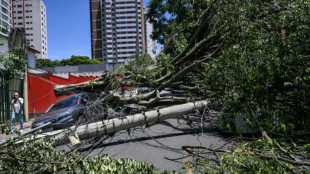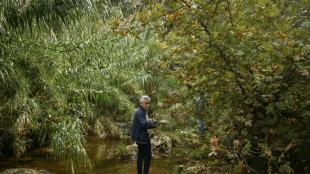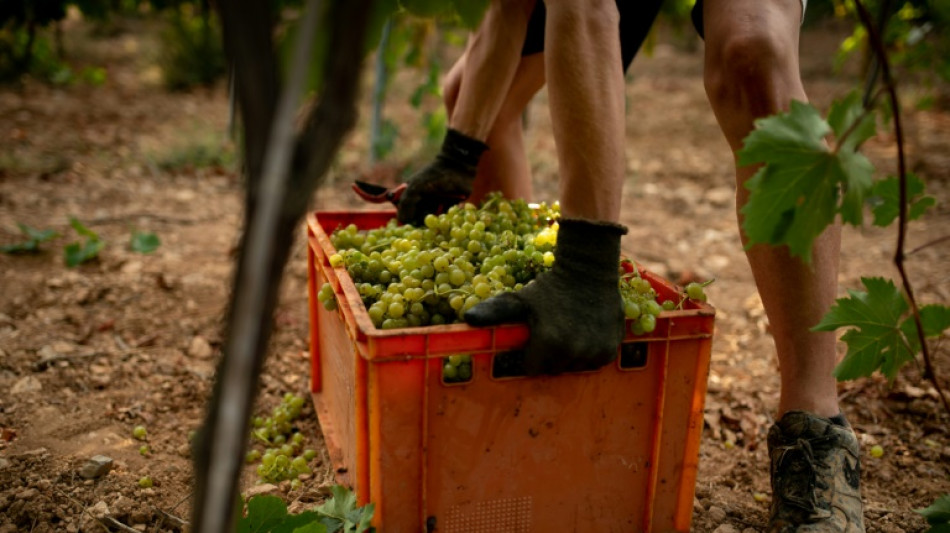
-
 Islamabad puts drivers on notice as smog crisis worsens
Islamabad puts drivers on notice as smog crisis worsens
-
Higa becomes first Japanese golfer to win Asian Tour order of merit

-
 Deja vu? Trump accused of economic denial and physical decline
Deja vu? Trump accused of economic denial and physical decline
-
Vietnam's 'Sorrow of War' sells out after viral controversy

-
 China's smaller manufacturers look to catch the automation wave
China's smaller manufacturers look to catch the automation wave
-
For children of deported parents, lonely journeys to a new home

-
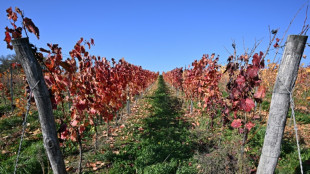 Hungary winemakers fear disease may 'wipe out' industry
Hungary winemakers fear disease may 'wipe out' industry
-
Chile picks new president with far right candidate the front-runner

-
 German defence giants battle over military spending ramp-up
German defence giants battle over military spending ramp-up
-
Quarterback Mendoza wins Heisman as US top college football player

-
 Knicks reach NBA Cup final with 132-120 win over Magic
Knicks reach NBA Cup final with 132-120 win over Magic
-
Campaigning starts in Central African Republic quadruple election

-
 NBA Cavs center Mobley out 2-4 weeks with left calf strain
NBA Cavs center Mobley out 2-4 weeks with left calf strain
-
Tokyo-bound United flight returns to Dulles airport after engine fails

-
 Hawks guard Young poised to resume practice after knee sprain
Hawks guard Young poised to resume practice after knee sprain
-
Salah back in Liverpool fold as Arsenal grab last-gasp win

-
 Raphinha extends Barca's Liga lead, Atletico bounce back
Raphinha extends Barca's Liga lead, Atletico bounce back
-
Glasgow comeback upends Toulouse on Dupont's first start since injury

-
 Two own goals save Arsenal blushes against Wolves
Two own goals save Arsenal blushes against Wolves
-
Trump vows revenge after troops in Syria killed in alleged IS ambush

-
 Maresca bemoans 'worst 48 hours at Chelsea' after lack of support
Maresca bemoans 'worst 48 hours at Chelsea' after lack of support
-
Teenage pair Ndjantou, Mbaye star as PSG beat Metz to go top

-
 Drone strike in southern Sudan kills 6 UN peacekeepers
Drone strike in southern Sudan kills 6 UN peacekeepers
-
Crime wave propels hard-right candidate toward Chilean presidency

-
 'Magic' Jalibert guides Bordeaux-Begles past Scarlets
'Magic' Jalibert guides Bordeaux-Begles past Scarlets
-
Teenage pair Ndjantou and Mbaye star as PSG beat Metz to go top

-
 Anglo-French star Jane Birkin gets name on bridge over Paris canal
Anglo-French star Jane Birkin gets name on bridge over Paris canal
-
Jalibert masterclass guides Bordeaux-Begles past Scarlets

-
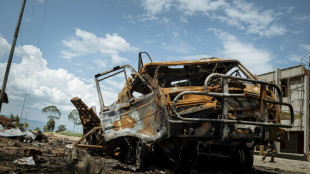 M23 marches on in east DR Congo as US vows action against Rwanda
M23 marches on in east DR Congo as US vows action against Rwanda
-
Raphinha double stretches Barca's Liga lead in Osasuna win

-
 Terrific Terrier returns Leverkusen to fourth
Terrific Terrier returns Leverkusen to fourth
-
Colts activate 44-year-old Rivers for NFL game at Seattle

-
 US troops in Syria killed in IS ambush attack
US troops in Syria killed in IS ambush attack
-
Liverpool's Slot says 'no issue to resolve' with Salah after outburst

-
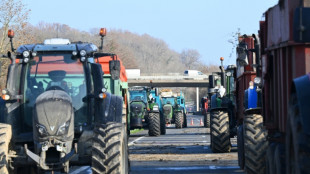 'Stop the slaughter': French farmers block roads over cow disease cull
'Stop the slaughter': French farmers block roads over cow disease cull
-
Stormers see off La Rochelle, Sale stun Clermont in Champions Cup

-
 Maresca hails Palmer as Chelsea return to winning ways against Everton
Maresca hails Palmer as Chelsea return to winning ways against Everton
-
Hungarian protesters demand Orban quits over abuse cases

-
 Belarus frees protest leader Kolesnikova, Nobel winner Bialiatski
Belarus frees protest leader Kolesnikova, Nobel winner Bialiatski
-
Salah sets up goal on return to Liverpool action

-
 Palmer strikes as Chelsea return to winning ways against Everton
Palmer strikes as Chelsea return to winning ways against Everton
-
Pogacar targets Tour de France Paris-Roubaix and Milan-San Remo in 2026

-
 Salah back in action for Liverpool after outburst
Salah back in action for Liverpool after outburst
-
Atletico recover Liga momentum with battling win over Valencia

-
 Meillard leads 'perfect' Swiss sweep in Val d'Isere giant slalom
Meillard leads 'perfect' Swiss sweep in Val d'Isere giant slalom
-
Salah on Liverpool bench for Brighton match

-
 Meillard leads Swiss sweep in Val d'Isere giant slalom
Meillard leads Swiss sweep in Val d'Isere giant slalom
-
Indonesia flood death toll passes 1,000 as authorities ramp up aid
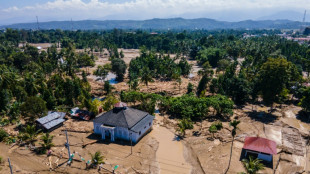
-
 First urban cable car unveiled outside Paris
First urban cable car unveiled outside Paris
-
Vonn second behind Aicher in World Cup downhill at St Moritz


Spain, Portugal dryness 'unprecedented' in 1,200 years
Parts of Portugal and Spain are the driest they have been in a thousand years due to an atmospheric high-pressure system driven by climate change, according to research published Monday, warning of severe implications for wine and olive production.
The Azores High, an area of high pressure that rotates clockwise over parts of the North Atlantic, has a major effect on weather and long-term climate trends in western Europe.
But in a new modelling study published in the journal Nature Geoscience, researchers in the United States found this high-pressure system "has changed dramatically in the past century and that these changes in North Atlantic climate are unprecedented within the past millennium".
Using climate model simulations over the last 1,200 years, the study found that this high-pressure system started to grow to cover a greater area around 200 years ago, as human greenhouse gas pollution began to increase.
It expanded even more dramatically in the 20th century in step with global warming.
The authors then looked at evidence of rainfall levels preserved over hundreds of years in Portuguese stalagmites, and found that as the Azores High has expanded, the winters in the western Mediterranean have become drier.
The study cites projections that the level of precipitation could fall a further 10 to 20 percent by the end of this century, which the authors say would make Iberian agriculture "some of the most vulnerable in Europe".
They warn that the Azores High will continue to expand during the 21st century as greenhouse gas levels rise, leading to an increasing risk of drought on the Iberian Peninsula and threatening key crops.
"Our findings have important implications for projected changes in western Mediterranean hydroclimate throughout the twenty-first century," the authors said.
- Wither vines -
The Azores High acts as a "gatekeeper" for rainfall into Europe, according to the study, with dry air descending in the summer months to cause hot, arid conditions in much of Portugal, Spain and the western Mediterranean.
In the cool, wetter winter period, the high-pressure system swells, sending westerly winds carrying rain inland.
This winter rain is "vital" for both the ecological and economic health of the region, but it has been decreasing, particularly over the second half of the 20th century.
While previous research had not untangled the effects of natural variability on the Azores High, the authors said their findings show its expansion during the industrial era is linked to the rise of atmospheric greenhouse gas concentrations.
A study cited in the latest research estimates that the area suitable for grape growing in the Iberian Peninsula could shrink by at least a quarter and potentially vanish almost completely by 2050 because of severe water shortages.
Meanwhile, researchers have predicted a 30-percent drop in production for olive regions in southern Spain by 2100.
Winemakers are already looking for ways to adapt to the changing climate, such as moving vineyards to higher altitudes and experimenting with more heat-tolerant varieties.
Last year, scientists found that a severe spring frost that ravaged grape vines in France was made more likely by climate change, with the plants budding earlier and therefore more susceptible to damage.
D.Schneider--BTB

